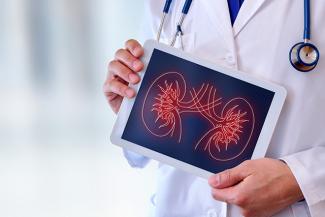
Worldwide 850 million people suffer from some form of kidney disease. Kidney diseases are also one of the leading causes of death worldwide, estimated to be 2.4 million deaths per year. Dr. Rajesh Kumar, a Kidney Specialist and Transplant Surgeon from Mumbai helps explain the misconceptions around kidney health.
PatientsEngage asked Dr. Rajesh Kumar about common beliefs on Kidney health:
I must drink 8 glasses of water daily to keep my kidneys healthy and get rid of toxins.
One to 1.5 liters is good enough to remove toxins which are produced daily in the body. If kidney function is normal and a person has kidney stones then it is advisable to take extra fluid and intake should be more than 3 litres to flush out existing stones and prevent the formation of further kidney stones. If kidney function is not normal and person has kidney stones then fluid intake depends on fluid status of body. Your doctor will advise you on how much fluid intake you need based on your tests.
Taking protein powder or supplements or going on a Protein-rich diet is okay.
Normal Protein intake is 1gm/kg of weight/day and in case of weak kidney, protein intake is decreased by 20% (0.8 gm/kg/day) to slow down the progress of kidney disease.
8 Must Know Protein Facts
Excess protein increases the load on the kidney as the kidney needs to perform more hard work to remove toxins and acids produced from excess protein. Excess protein also causes proteinuria, which is protein (albumin) in the urine. Excess intake of protein over extended periods of time can lead to proteinuria which is a sign of kidney damage. A normal person’s urine would never show any protein in the urine.
Kidney disease is not very common
Kidney disease is common. The approximate prevalence of Chronic Kidney Disease(CKD) is 800 per million population (pmp). 1 in 10 persons in the general population are estimated to have some form of chronic kidney disease. The incidence of end-stage renal disease (ESRD) is 150–200 pmp and approximately 175,000 new people have kidney failure every year in India and require dialysis and/or kidney transplantation. It has also been estimated that about 60% to 70% of CKD cases are due to diabetes and hypertension. Progress of Chronic Kidney Disease to end stage kidney disease takes about 10 to 15 years and therefore it is important to take preventive measures at the earliest.
I don’t have trouble passing urine, which means my kidneys are fine.
Both Kidneys make 1-1.5 liters of urine every day to remove metabolic waste/toxin from the body. Patients on dialysis also make urine daily! While, normal functioning kidneys maintain salt and water, acid base and bone strength, damaged kidneys are not so efficient at their jobs. Hence, the only way to know if your kidneys are fine is by doing urine and blood testing.
Once my blood pressure becomes normal with treatment, I can stop taking my BP pills.
Kidneys aid in blood formation and regulation of blood pressure. High blood pressure can affect the brain, retina, heart, kidney and blood vessels. Normal blood pressure is important to prevent kidney disease and heart disease. If your high blood pressure is controlled on medication, dose of medication can be titrated with close monitoring of blood pressure. We can decrease the dose of blood pressure controlling medicine and continue monitoring the blood pressure, If blood pressure is remaining normal then dose can be reduced further. Do not discontinue medication without your doctor’s approval as it can have devastating effects.
I would know when my kidneys are failing.
Failing kidneys usually produce no symptoms or signs! Early detection of kidney disease is possible only by having Urine examination and Serum Creatinine report. Microalbuminuria is the earliest finding of kidney dysfunction. Staging of chronic kidney disease is based on eGFR (estimated glomerular filtration rate) and this can also be used to know and monitored the progress of kidney disease.
Dialysis is the only treatment for Kidney disease.
With early diagnosis, progression of chronic kidney disease can be slowed down. Once kidney function is less than 15ml/min, renal replacement therapy in the form of dialysis or kidney transplantation is the treatment option. Dialysis is a simple way of removing excess salt, water and waste from the body and prolonging life for patients for several years. According to National Kidney Foundation, many patients on dialysis live comfortably for 20 to 30 years. If you are eligible, kidney transplantation is a better option, as quality of life after transplantation is improved than for patient on dialysis. About 3-4% of patients get kidney transplant while the rest go for dialysis.
Lived experiences of people with kidney disease
Dialysis means that there is no more hope.
Dialysis is not an end of life situation. A patient can survive and continue having a normal life and even work while on dialysis. Majority of patients do not receive the treatment for kidney failure either because of financial constraints or lack of dialysis units near their homes. In developing countries, only 20% to 25% of kidney patients have access to treatment and can afford dialysis.
Dr Rajesh Kumar is the Director of Apex Kidney Care, chain of Dialysis Networks in Mumbai and also serves at BSES MG Hospital in Andheri and Hiranandani Hospital in Powai. His areas of focus include renal transplants, critical care and latest technological advances in dialysis.







